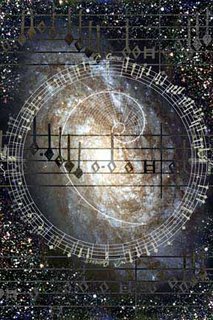Listened to: more Father Brown, part of the soundtrack to “Evita,” and my “Music Composition in Medieval and Renaissance Forms” students’ final compositions.

I need to put a caveat on my comments about art that opposes “natural principles.” Let it never be assumed that I think it is for that reason not art! 12-tone music, for example, is a very impressive art form. Schoenberg and the rest thought that the traditional foundations on which music had been built for centuries had crumbled, so they decided to invent a new system. They did not set out to work contrary to the way the universe works; they simply chose a new method. The system of ternary harmony, they thought, was worn out. This system of triads, by the way, seems to have some “natural” basis in the radio frequencies/pitches produced by the planets, or the “songs of the stars.” These theories stem from Pythagoras, Ptolemy, and Kepler.
Click here for Music of the Spheres
But Schoenberg & Co. decided to use a new system, a mathematical principle of musical equality. There’s nothing wrong with that as a philosophy. But, see, they really thought that it would be great as a music, too. Schoenberg is often quoted as saying in a few generations or so, kids would be whistling 12-tone rows in the street. Well. It didn’t work. And I don’t like the music. I love studying it (what could be more fun than a dodecaphonic matrix, I ask you that??), but I don’t like to listen to it. That could be just me. But have I any right to say it is not great art just because it sounds awful??
And what about composers who dip a mouse’s feet in ink and let it walk across the score, then play the resulting notes? Aren’t a mouse’s steps according to nature? Hum. I’m arguing with myself here. Sure, there’s rhythm and pattern in the way that little guy trots. But does it therefore follow that it would make good music? Funnily enough, aleatoric (“chance”) music and serialized (12-tone) sound pretty much the same. The least organized and the most organized.
So, in other words, I have no idea what I’m talking about when I say art must conform to natural principles to be great. There seems to be no logical reason why an “arbitrary” organization some guy came up with out of his head is unnatural. Aren’t human thought processes natural? And really, those paintings made by elephants, or monkeys, or dogs, are more natural, in one sense, than those made by people through their overactive rationality. This is coming back around, like the conversation on soul. We probably cannot tell how much soul is in a work.
Is everything a strange loop?!?
Thanks to the brilliant Douglas Hofstader
5 comments:
I loved that post! Sorina, your writing definitely has your soul in it ;-) Glad to see you know and love Gödel, Escher, Bach too! One of my favorite books. It's about time for a reread, I'd say. I read it about 20 years ago.
One of my favorite quotes (I had it under my picture in my high school yearbook) is "Mathematics, rightly viewed, possesses not only truth, but supreme beauty." (Bertand Russell). I didn't realize until just now, when I did a Google search for it, that the quote goes on to say "... -- a beauty cold and austere, like that of sculpture." So, yes, music composed based on mathematical relationships can be beautiful in some sense, though that definition of beauty might not necessarily coincide with the definition that includes "pleasant to listen to."
Speaking of mathematical relationships and beauty, it is no accident that visual art based on the golden ratio (a.k.a. the golden mean, the divine proportion) is pleasing to look at. The Fibonacci series (1, 1, 2, 3, 5, 8, 11,...) forms the basis of much that is beautiful in nature (the spiral arrangement of the seeds in a sunflower or the scales of a pine cone, for example). When I say "it is no accident..." I'm not quite sure what I mean. Of course, God designed nature such that these mathematical ratios would be beautiful, but why exactly do we find them pleasing to look at? God designed platypuses (platypi? [see discussion on the plural of platypus in that Wikipedia article]) too, but they're kind of ugly.
The golden proportion is one of my delights, as as the Fibonacci sequence, and as is the infinitely decreasing but never equalizing difference between them.
We are trying to incorporate the Golden Proportion into the facade of the home we are building. Oh joy!
And long has humankind loved these proportions, whatever names or none were given them. As Yeats has it:
...boys and girls, pale from the imagined love / Of solitary beds... pressed at midnight in some public place / Live lips upon a plummet-measured face....
Click here for the complete poem.
By the way, are you certain the platypus is ugly? What might he think of us?
Behold the hippopotamus!
We laugh at how he looks to us,
And yet in moments dank and grim,
I wonder how we look to him.
Peace, peace, thou hippopotamus!
We really look all right to us,
As you no doubt delight the eye
Of other hippopotami.
-- Ogden Nash
See also The Hippopotamus Song (Flanders & Swann, from "At the Drop of a Hat")
Includes the line:
"The hippopotamus was no ignoramus."
[pronounced hip"-po-po-TAY'-mus in order to rhyme with ignoramus]
Post a Comment